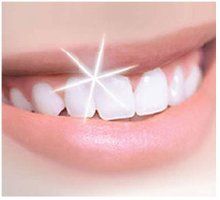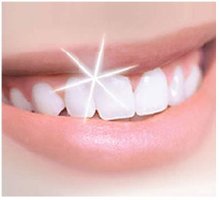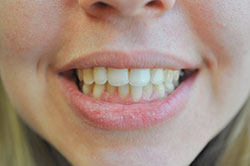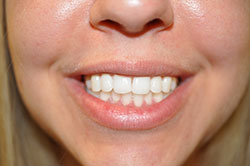
Tooth Whitening and Tooth Damage
 So, you’re looking at all of those ads with bright white teeth, and you’re thinking, “I want that smile!” While we all want pearly whites, you may be doing some permanent damage to your teeth with those over-the-counter whitening kits if you’re using them too often. Adriana Manso, professor from the University of British Columbia, states, “When you’re doing it under supervision, you have someone controlling how much the bleaching progresses … if you do it yourself you can overdo it”. A study conducted in Switzerland and Austria recently found that gels with low peroxide concentration (over the counter) and longer contact time negatively affected the enamel surface. Translation, weaker, over-the-counter treatments can be both less effective and more damaging to the tooth structure. Continuous tooth whitening can lead to tooth damage.
So, you’re looking at all of those ads with bright white teeth, and you’re thinking, “I want that smile!” While we all want pearly whites, you may be doing some permanent damage to your teeth with those over-the-counter whitening kits if you’re using them too often. Adriana Manso, professor from the University of British Columbia, states, “When you’re doing it under supervision, you have someone controlling how much the bleaching progresses … if you do it yourself you can overdo it”. A study conducted in Switzerland and Austria recently found that gels with low peroxide concentration (over the counter) and longer contact time negatively affected the enamel surface. Translation, weaker, over-the-counter treatments can be both less effective and more damaging to the tooth structure. Continuous tooth whitening can lead to tooth damage.
What’s the big deal? Enamel is the protective outer coating of your tooth, and is considered the hardest substance in the body (even more than bones). Enamel insulates the rest of the tooth so that you don’t feel discomfort when you eat or drink something that’s particularly hot or cold. As enamel is softened or lost, the underlying tooth structure is opened to damage. Overuse of whitening treatments can weaken your enamel and also cause sensitivity to gum tissue as well. This can lead to chronic inflammation of gum tissue and can cause periodontal disease over time. Oddly, if you’re over whitening your teeth and causing enamel to be lost, your teeth will actually appear more yellow. This is because underneath your enamel is the dentin of your tooth, which has a yellow color. The more the enamel is damage, the more the dentin structure will show.
What’s a person to do? Professional tooth whitening is fine, as long as it’s not done continuously. It is suggested that people bleach their teeth no more than 1x a year, using a week’s worth of treatment. An in-office whitening program is much safer, and more regulated than the over-the-counter brands, plus you will get professional treatment and guidance. If you have crowns, fillings, or veneers, these will not whiten, as they are permanently the color they were made, and will not change based on whitening.
Certain things can affect the effectiveness of your treatment:
- Smoking
- Certain antihistamines, antipsychotics and high blood pressure medications. Young children who are exposed to antibiotics like tetracycline and doxycycline when their teeth are forming (either in the womb or as a baby) may have discoloration of their adult teeth later in life. Chemotherapy and head and neck radiation can also darken teeth.
- Coffee, Teas (Black), and Red Wine can stain your teeth
For more info on tooth whitening, check out what the American Dental Association has to say.
Below is an in-office case we did for a patient. Check out the before and after and call us at Altman Dental to discuss the right treatment option for you. We do in-office whitening treatments in our dental office in Williamsville, NY.

